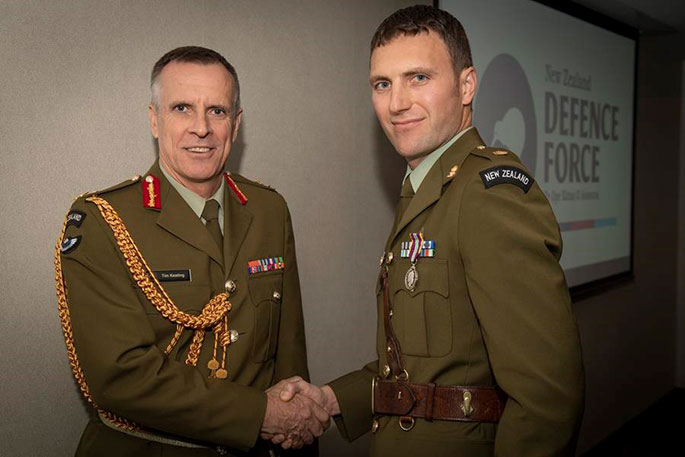A cool head, collected nature and the ability to communicate in difficult situations – things that sum up what you'd like to see in a person who takes a lead in ensuring the region is ready to response to a Civil Defence emergency.
For Bay of Plenty Emergency Management's Jono Meldrum, manager of the Operational Readiness function, those abilities are not just something on a job description.
They're the abilities he has proven he has, as they've seen him awarded the Defence Meritorious Medal by the Chief of Defence Force, for work in South Sudan during his previous life in the New Zealand Army.
Now living in the Bay of Plenty, Jono currently manages the team that helps the region's councils get ready for and respond to civil defence emergencies.
'Our work involves the delivery of formal training, developing and running exercises, and working alongside councils as advisors during events,” Jono explains.
'We're seeing the overall ability of the region to respond to emergencies slowly improve, and we're seeing local councils starting to take a real interest in how they can best prepare their staff for the unique demands of emergencies. So that is pretty exciting and ultimately benefits all of us who live here.”
But it's in his previous work for the Defence Force where he learned many of the skills he now applies on a day to day basis.
'I'm pretty comfortable in messy, chaotic and unclear situations,” Jono says.
'The Army prepared me for them, taught me how to work through them, and put me into enough of them so I got a bit of practice. That is probably the skill that I've leveraged off the most since leaving the Army and I think it's pretty relevant to emergency management.”
In South Sudan, Jono was required to use all those abilities to ensure the safe passage of supplies to a United Nations base at Malakal.
The award recognises the work he did in that situation under intense pressure, enabling vital supplies were able to get through to those who required them.
He describes his time in the Army as one that provided him with a range of experiences and put him into a number of different experiences, such as the one in South Sudan.
'I was pretty lucky in that I got to experience a whole range of activities in the Army. I had some incredibly exciting times, in different parts of the world with some amazing people: undertaking reconstruction work in the Vanuatu islands following a cyclone, training exercises with my soldiers in the freezing Waiouru winter, working for the United Nations in South Sudan during a civil war, and building new camp facilities with local engineers in Afghanistan.
'Although the circumstances were not always pleasant, there was always at least a hint of hope. And there would always be something that would show the beauty of the human spirit and remind you that it was possible to make a small difference.”
And while it's been an overall change in pace, the shift to Emergency Management has been one he's enjoyed.
'I enjoy the fact that if I do this properly, we will make a real difference in the ability of councils across the region to respond to emergencies, and that will have a real and tangible impact on our communities.
'And although I don't wish for them, I enjoy the challenge of finding my A-game when there's an event brewing or an emergency has occurred. I enjoy those intense periods of focus and commitment that emergency events demand.”
He says there are still challenges to be had, although they might be slightly different to those faced while serving our country.
'On a personal level, my biggest challenge has been adapting to the consultative environment we work in. It's probably taken me a couple of years to genuinely understand the importance of collaborating and consulting with people, and the benefits of sharing the journey together.
'It's a bit of a change from the way the Army does business!” he explains.
'But the Army did teach me to adapt to situations, so I've tried to do exactly that. I wouldn't say I've nailed it, but it's a work in progress.”



0 comments
Leave a Comment
You must be logged in to make a comment.